
- This event has passed.
E-Pomodoros: Writing Skills for Business Engagement
29th June 2020 @ 10:00 am - 12:00 pm

DETAILS
Initial launch session:
Date: Monday 29th June
Time: 10am – 12pm
Location: Microsoft Teams
Deadline for applications: Monday 22nd June
Download the application form.
ABOUT
“E-Pomodoros: Writing Skills for Business Engagement” is for social science doctoral students and early career researchers to develop writing skills relevant to:
-
Inviting and engaging businesses in research
-
Translating own research for business utilisation
-
Securing bids for business engagement
-
Planning the above to realistically integrate into demanding workloads.
“E-Pomodoros” are an innovative adaptation of writing retreats and ‘shut up and write’ sessions over skype or twitter (#suaw), where a group of researchers dedicate time together to focus on an aspect of their research, driven by visual accountability (see Cirillo, 2018, Kelly, 2020). The process encourages each participant to focus on live and priority areas of writing.
OVERARCHING OUTCOME
By the end of the programme, doctoral students and early career researchers will have developed skills relevant to their business engagement priorities (1-4 above).
Session outcomes
By the end of each session participants will have:
-
Dedicated time on their business engagement writing tasks with like-minded researchers
-
Accessed and learnt practical writing tips and techniques for business engagement
-
Experimented with and reflected on personally relevant sustainable writing practices
STRUCTURE
There are two main strands:
-
Springboard ePomodoro – Researchers will start in an initial 2-hour session on Monday 29th June 10am-12pm as an introduction and induction, share writing for business engagement priorities, and engage in 3 writing sessions. It will also confirm the exact model and timing of the following ePomodoros (e.g. daily x 1 hour). The model below is an example.
-
Daily ePomodoros – Researchers will then access up to 15 x 1 hour Daily ePomodoros over the following 3 weeks (Monday to Friday) to begin to develop and test their new writing habits.
FACILITATOR
Professor Tony Wall is a prolific researcher and has extensive business engagement experience including collaboration and consultancy. He is Head of the International Centre for Thriving at the University of Chester, and has extensive experience of researcher development in the UK, Denmark, Sweden, Australia, and online.
